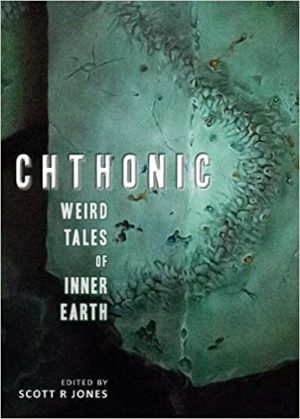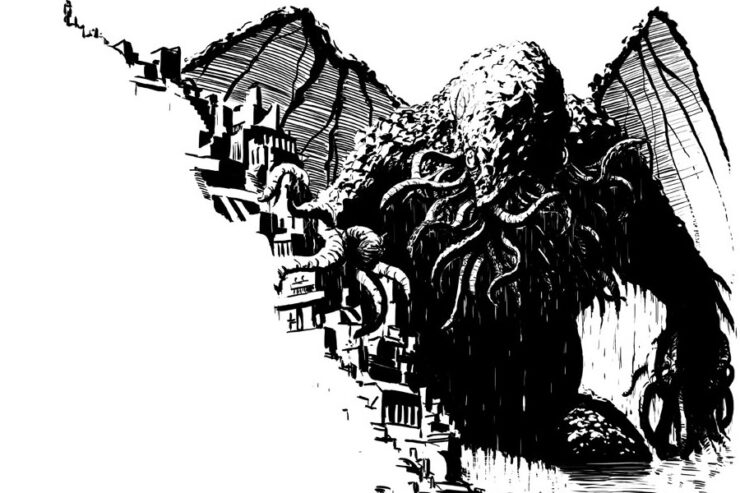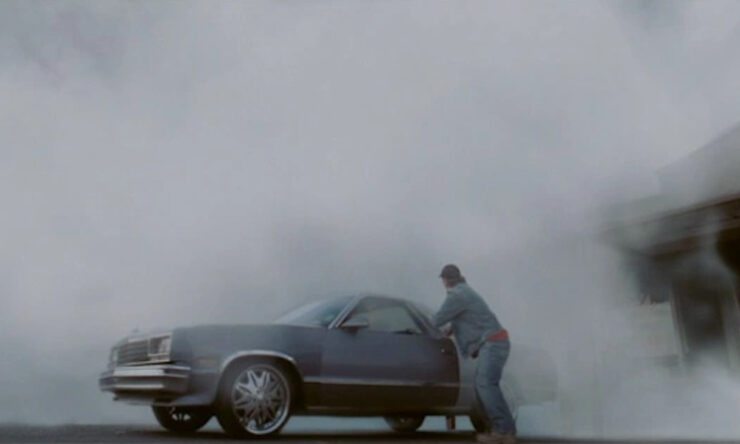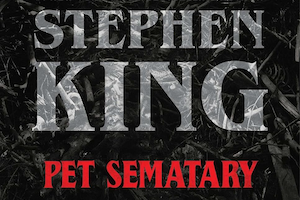Welcome back to Reading the Weird, in which we get girl cooties all over weird fiction, cosmic horror, and Lovecraftiana—from its historical roots through its most recent branches.
This week, we cover Sarah Peploe’s “UNDR,” first published in Scott R. Jones’s 2018 anthology, Chthonic: Weird Tales of Inner Earth. Spoilers ahead.
We crawled from the seas and from the trees at its sufferance and walked above it, likewise, at its sufferance. Slipped down through its pores, by its sufferance.
Rosie is a Ph.D. candidate whose thesis deals with the intersection of gender and class; just out of the train station in an unnamed city, she enjoys all the intersecting genders and classes, professions and ages and eccentricities swarming the streets. Everyone strikes her as “madly in love with themselves [with] damn good reason to be”; at the same time, “their self-love would not scrape up against yours. It would encompass you too. Affable. That was the word.” Her laptop bag, with its fluffy monster face, draws an admiring remark from a tough-looking teenage girl. Rosie takes this as a good omen, though she knows the boyfriend she’s come to meet won’t welcome the sight of her laptop. Well, she’s only brought it to use on the train…
Callum meets her at the hotel he’s picked, “central, and cheap, and unusual.” UNDR is unusual, all right. Though glass and steel like the surrounding skyscrapers, it’s only one story high, with a lobby tiny as an anteroom. Cal sweeps her into a kiss, confirming for a relieved Rosie that though they’re separated for weeks at a time, “reunited, they would both be the same as they ever were.” The receptionist, who wears a long-sleeved shirt in an odd pattern, hopes they’ll enjoy their stay.
Rosie supposes from its entrance that UNDR must be tiny. Instead, iceberg-like, it conceals most of its bulk under the surface. Their room is on the sixth of eleven subterranean floors. Like the bright-lit hallway, Room 624 has a “scrubbed, sanitized” smell. Much of the furniture folds out from walls paneled with screens and keypads. It reminds Rosie of Sixties-era visions of the future. Still, it’s only a base for their weekend explorations, and protracted lovemaking restores her good mood.
Buy the Book
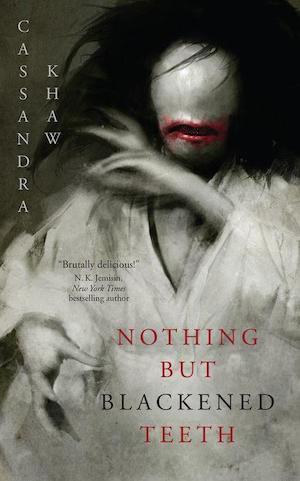

Nothing But Blackened Teeth
The two sleep through Friday night, going without dinner though Rosie notes a Room Service menu and delivery dumbwaiter in easy reach of the bed. She wakes on Saturday with an uneasy feeling that she’s “something small in a forest… knowing, as a standing truth of the world, that it is being snuck up on, but not knowing how or from which direction.”
A new receptionist, in the same odd-patterned shirt, recommends a nearby café, adding that UNDR’s room service is a great option anytime. Their day of gallery visits and shopping goes well until Cal suggests they move together to this “affable” city—he’ll get a new job, and she can commute to university. She doesn’t really need to be on-site for doctoral work, right? It’s not that simple, Rosie says, spurring Cal to grouse that she’s “always got to think everything to mince.” Back in UNDR, he admits to fearing their relationship is “leaking away.”
Saturday night leaves them happily inebriated. Rosie notices a diamond-shaped mark on her shoulder, but dismisses it as a hickey. The night receptionist reminds them of the Room Service option. Why, Rosie wonders, does everything about UNDR urge the patrons to just stay in their underground rooms? That’s called convenience, Cal snipes: Some people like it. In the sixth floor hallway, she notices that doorways seem to have shifted. Yellow-green liquid seeps out from under a poster, smelling like “the strongest, most astringent cleaning material imaginable, but also profoundly dirty.” Cal pooh-poohs her impressions. In the room itself, floor tiles look rearranged, and the plastic-walled bathroom reminds her of a Portaloo and her irrational fear that someone might tip the thing over and leave her awash in “the filth of thousands.”
Sunday morning they order breakfast via Room Service. Rosie smells that clean-dirty stink when opening the dumbwaiter, but the food’s delicious. Rosie starts agonizing about how, after this, they won’t see each other again for a month or more. Is their time together really leaking away? Just wanting “to be happy with him,” she agrees to stay in for a Room Service dinner.
Rosie has promised not to work on her thesis this weekend, but while Cal showers she types notes. Cal catches her, and their argument escalates. He says she can’t stay in university forever but needs to “go into the real world.” Like him? Rosie snaps back. Is he the worst fate imaginable, he demands? She runs from the room, desperate to breathe unrecycled air.
Somehow she can find neither lifts nor a stairway. Emergency exit signs lead her into senselessly convoluted stretches of corridor, where doorless walls bulge and that clean-dirty smell waxes. Oppressed by a sense of all the earth above her, she fights panic.
Then a Labrador-sized “chicken fillet” scuttles around a corner, eight pointy feet clicking. She screams. The first two receptionists appear, shirtless, their skin mottled with diamond-shaped sores. They reassure her the “fillet” is harmless, a sort of “flora” that “helps keep things moving.” But why did she leave her room when she has everything she needs there?
Floor and walls split around Rosie, exposing slick flesh coated with yellow-green slime. The receptionists explain: What she sees is the ancient creature which bides below, feeding until it’s strong enough to inherit the earth. UNDR contains only its guts—think how wondrous its head and heart must be!
A toxic breeze makes Rosie retch. She begs the receptionists to let her go, or at least Cal who hasn’t discovered their secret. No, the receptionists say. Cal came looking for her, you see.
And there he is, rising out of the fleshy wall, already half-consumed. Rosie screams before the wall envelops her, “pressing Cal’s remains through her living body” so that they sink together into “the old under-here.”
Rendered “one and the same,” they become what it makes of them.
What’s Cyclopean: When Cal’s upset, “his shoulder turned to gravestone granite under her cheek.” Ouch.
The Degenerate Dutch: Cal doesn’t quite call Rosie a “clever bitch,” but the accusation has clearly come up in the past.
Weirdbuilding: Impossible turns in the depths of the hotel—sounds suspiciously like non-Euclidean geometry.
Libronomicon: Rosie’s dissertation is on—or at least includes a section on—the intersection of gender and class in moral panics. Which might also explain some of what’s going on with Cal.
Madness Takes Its Toll: No madness this week, unless you want to count the receptionists’ delighted worship of it.
Anne’s Commentary
While browsing through anthology titles on my Kindle, I noticed Chthonic. I first encountered the root of this word in Brian Lumley’s “Cement Surroundings,” which featured a race called the Chthonians; given the power of early associations, I think of these giant earth-squids instead of the Greek gods of the underworld whenever anything “chthonic” is mentioned. I was hoping editor Scott R. Jones had compiled a collection of stories about my favorite subterranean Mythosians, but Jones’s selections are far more wide-ranging. As he puts it in his introduction, “they plumb the depths of earth at least as deeply as they explore the human capacity for suffering and enlightenment.”
Sarah Peploe’s “UNDR” superbly meets those editorial criteria, if maybe the other way around. That is, “UNDR” concerns itself first with the complexities of modern romance and then, increasingly, insidiously, with the primal reality underlying (and ultimately rendering meaningless) all that urban monkey chatter and mating angst. And it couples two of my favorite horror tropes: the BEAST BELOW and the HAUNTED HOTEL. Beneath Colorado’s Stanley Hotel, inspiration for Stephen King’s Overlook in The Shining, are a cave system and higher-than-average concentrations of limestone and quartz, minerals which ghost hunters speculate could collect the psychic energy needed to power spooks. What lies beneath the hotel UNDR? If it’s in London, as the Chthonic introduction suggests, there are sewage systems, underground railways, military and civil defense installations, utility infrastructure, subterranean rivers, and catacombs. It makes me wonder how the folks who designed and built UNDR ever got all the necessary permits to snake their way at least eleven stories down through such pre-existing subsurface chaos. The tortuous layout of the hotel’s corridors begins to make sense, at least.
Also, of course, the government has to know about the subcity Beast. Equally of course, the government must have been covering up Its Existence for centuries, not to panic civilians or hinder economic growth. My theory is that the Beast doesn’t underlie the city as one unbroken organic mass, an enormous pancake or sphere or blob—that would make underground construction impossible. Instead I’m thinking it’s more cryptic, filamentous, like the subterranean hyphal networks of mycorrhizal fungi. Infiltrating everywhere but concentrating into “feeding bodies” in certain prime locations. The receptionists tell Rosie that UNDR is only the guts of the beast, so presumably a self-contained alimentary system for the gathering and digestion and release of sustenance to the far-flung superorganism.
Maybe I needn’t have worried about all the bureaucratic hoops that builders must leap through, because Peploe hints that humans didn’t build UNDR—the Beast grew this seemingly glass and steel and plastic structure out of Its own protean substance. What appears to be a hotel is the Beast, which makes it a god-level mimic! A stonefish, for example, only looks like any other weed- and barnacle-encrusted rock on the floor of the tidepool. The Beast can also make Its flesh feel and function like walls, floors, and elevators. Even the one-story entrance to UNDR could be Beast, thrust to the surface like a mushroom from the underground fungal network. As part of a feeding body, it would serve as the mouth.
What about that arachnid-legged “chicken fillet” Rosie encounters? No healthy bowel would be without its symbiotic flora. If the “fillet” is scaled to the Beast as beneficial intestinal bacteria is to humans, imagine how big the Beast is. What about the receptionists—are they too Beast-flora or are they human? I’ve come down on the side of the more terrifying possibility. The receptionists are human, converted into the Beastly equivalent of Locutus of Borg either because they were willing cultists or unwilling victims of their own front-of-the-house suitability. Their weird shirts could be uniforms patterned after the “hide” of the Beast or actual Beast “hide” mimicking cloth. Their diamond-shaped wounds could have been inflicted by Beastly feeding appendages. Rosie might not be far off thinking her own diamond-scar is a hickey, only Cal wasn’t the one who inflicted it. People go to sleep in their comfy UNDR beds and, softly, gently, the walls exude maw-stalks…
With enough guests lured to UNDR’s easy rates and weird-chic, the Beast needs only nibble on each. Rosie and Cal are in the unfortunate minority from whom It takes all. I don’t think they have to die because they accidentally LEARN TOO MUCH. The Beast traps Rosie into penetrating Its secret by replacing Its “elevators” with “exit signs”—It doesn’t want her to check out. It wants to eat her all up.
Why? Does she run out of her room when It just happens to be extra peckish? Is she inherently extra-tasty? Do the uneasy dynamics of Rosie and Cal’s relationship produce a particularly savory energy? Their mutual attraction is strong, but so are the circumstances and attitudes and aspirations pushing them apart. The tragic thing is that it’s only in the belly of the Beast they can fully unite, and what is the belly of the Beast but the “old under-here,” the “standing truth of the world” that small forest-creatures like them must be devoured whole, one way or another.
Too bad it’s impossible to give negative Tripadvisor reviews post-assimilation.
Ruthanna’s Commentary
You know what, yes! We’ve had haunted houses galore, several institutions of higher learning in which to learn things you aren’t meant to know, and a whole chain of bad-idea magic shops. But where can you stay while presenting at the International Congress on Eldritch Phenomena? Consider this a call for more weird hotels. Not just the haunts Anne mentions above, but places where life and/or physics are not what we’re used to in the outside world.
Hotels are strange to begin with. Temporary homes in between, sometimes uncanny in their generic absence of personal detail. When they try for personality, they can get stranger: hipster hostels with branding in place of reassuring predictability. I’m thinking here of the convention overflow hotel with transparent walls between bathroom and bedroom. Or maybe the place in New York where they once put Titanic survivors, that still has bunkrooms the size of bunkbeds. Or the place in… somewhere in the Midwest, wherever the psychology conference was that one time, with an indoor river and a labyrinth of themed rooms. What I’m saying is that UNDR seems like a familiar type. I’m not honestly 100% sure that I’ve never stayed there. Aside from the smell, it would be hard to resist.
Peploe is new to me, and even beyond the temptingly cheap hipster hotel I’m impressed. The story slots together as well as the modular panels of an underground room. The claustrophobic and potentially all-consuming relationship is paralleled by the claustrophobic and potentially all-consuming hotel; the welcoming world above, full of potential new things and people to explore, is contrasted with the too-convenient horrors of the world below. After a couple of weeks of settings that start out gross and get grosser, I particularly appreciate that contrast. Not everything in Rosie’s world is terrible, which makes the terrible thing beneath all the more dreadful when we finally meet it.
I also like the complexity of her relationship with Cal. It’s obviously in the process of falling apart, but it’s not as irredeemable as, say, the central marriage in “The Mark.” Rosie’s reluctant to commit, which might be because Cal doesn’t respect her studies or might lead him to blame her studies when the real problem goes deeper. Cal is a dick about the things that matter to her, maybe because he senses that he’s only sort of on that list. Which still doesn’t make it okay when he’s furious over her taking notes while he’s in the shower. What is she supposed to do, spend 10 minutes mooning after him? Come into the bathroom and stare at his naked body? It’s interesting that we never get much sense of what he does, and why him moving to her university town isn’t an option. Or why they meet somewhere in between, rather than at either of their homes. Maybe the reluctance to commit goes both ways.
Both ways, but not all ways. Down, for example. The things underneath are very willing to commit. To wait patiently. To take what they need. I’m reminded—this one doesn’t come up often (so to speak)—of Lumley’s “Cement Surroundings.” The surface of the earth does mask unimaginable horrors, some more willing to chase after prey than others.
I also spot the Scary Eldritch Lobsters yet again, this time “breaking things down” in the depths of the hotel hallways. Bigger than the ones in The Fractured Atlas, smaller than the (eventual) ones in “The Essayist in the Wilderness.” Lawn buddies, man. They’re everywhere.
Next week, things are starting to come together, and the picture is terrifying for book-lovers everywhere. Join us for Chapter IV, sections IX-XVI, of John Connolly’s Fractured Atlas.
Ruthanna Emrys’s A Half-Built Garden comes out in July 2022. She is also the author of the Innsmouth Legacy series, including Winter Tide and Deep Roots. Her short story collection, Imperfect Commentaries, is available from Lethe Press. You can find some of her fiction, weird and otherwise, on Tor.com, most recently “The Word of Flesh and Soul.” Ruthanna is online on Twitter and Patreon, and offline in a mysterious manor house with her large, chaotic household—mostly mammalian—outside Washington DC.
Anne M. Pillsworth’s short story “The Madonna of the Abattoir” appears on Tor.com. Her young adult Mythos novel, Summoned, is available from Tor Teen along with sequel Fathomless. She lives in Edgewood, a Victorian trolley car suburb of Providence, Rhode Island, uncomfortably near Joseph Curwen’s underground laboratory.










